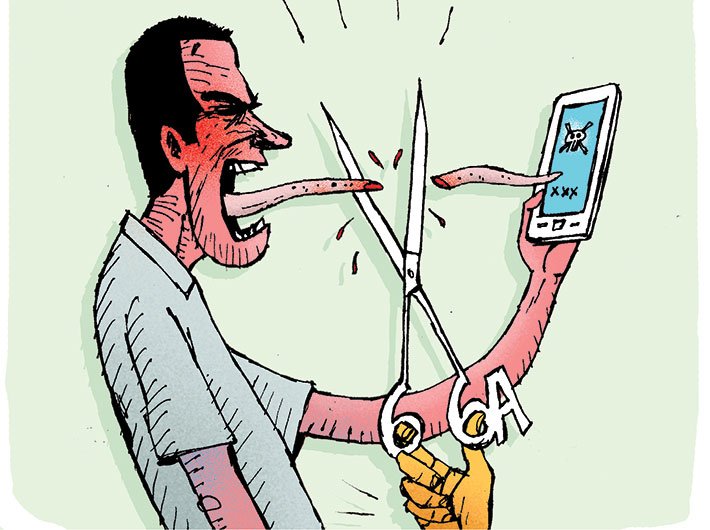Virtual world is fraught with real dangers, so be cautious when using internet and social media
Free speech has always been a subject of immense debate. Different legal regimes in different parts of the world have sought to regulate free speech on various grounds. In India, the constitution guarantees the fundamental right to freedom of speech and expression. However, this right under Article 19(1) of the constitution is not an absolute right. The state can impose various ‘reasonable’ restrictions under Article 19(2). These can be imposed in the interest of sovereignty and integrity of India, the security of the state, friendly relations with foreign states, public order, decency or morality or in relation to contempt of court, defamation or incitement to an offence. The supreme court has also upheld the reasonableness of such restrictions.
In this context, there is one provision in the cyber law which has got the attention of all stakeholders, i.e. section 66A of the Information Technology Act, 2000. In India, there have been many controversies over the use of this section. Kolkata-based professor Ambikesh Mahapatra was arrested for forwarding caricature/cartoons on Facebook. The Ravi Srinivasan Twitter case showed how a person’s tweets could be brought under the ambit of section 66A. Mumbai residents KV Rao and Mayank were arrested for allegedly posting offensive comments against some leaders on their Facebook group.
This article aims to explain what section 66A is all about.
Section 66A makes it an offence when you send, by means of a computer resource or communication device, any information that is offensive or has menacing character.
Any information which you know to be false but which is sent for the purpose of causing annoyance; inconvenience; danger; obstruction; insult; injury; criminal intimidation; enmity; hatred; or ill will. All these must be done persistently by using a computer resource or communication device. Any e-mail or electronic mail message for the purpose of causing annoyance; inconvenience; to deceive the addressee or recipient about the origin of such messages; or to mislead the addressee or recipient about the origin of such messages, also come under this section. So, if you are a social media user or even if you are a user of a computer system or mobile, be careful. You could be brought within the ambit of this section.
To help understand its scope let’s examine some common illustrations of acts which could come under this section. When you send either by means of a computer, mobile phone, tablet or any other communication device, the following kind of information, you could be covered under this section. If you swear or abuse somebody, it could be said to be grossly offensive or to be having menacing character. Anything defamatory which affects the character, reputation, standing or goodwill of a person could be deemed to be grossly offensive, as also making false allegations against the character of a person or character assassination. Using insulting words or symbols which are obscene, calling someone names, posting the picture of a person in uncomplimentary situations and environments; electronic morphing which depicts a person in a bad light, using swear words, threatening somebody with consequences for his life, information aimed at hurting religious sentiments, showing gods and goddesses of particular religions in an uncomplimentary light, putting the picture of a person against a slogan/phrase/saying which does not depict his true character or personality, deceiving the addressee or recipient about the origin of such messages (sending emails from a fake account), sending emails and SMSs in the name of RBI or containing fake recruitment offers all qualify as offences under section 66A.
The aforesaid are just some illustrations to demonstrate how broad section 66A is and how and in what particular comprehensive manner can it impact you and your life. These illustrations are neither comprehensive nor complete but have been given as selective examples of the ambit of section 66A, for academic, research and review purposes only. This section can, however, also be effectively used as a tool for gagging legitimate free online speech. The problem with section 66A is that it comes up with extremely wide parameters which have not been defined clearly. These parameters are capable of being interpreted in any manner possible by law-enforcement agencies. Given the advent of technology and the way people are misusing the same, there could be millions of situations which could qualify as offences.
Threats and lessons
The learnings from section 66A are that till such time this section is either changed, modified, varied or amended, it will be imperative that you exercise due diligence when you send information on the internet, social media and mobile networks. Kindly note that the focus of the law is not on publishing information, it is instead on the offence of sending information. This assumes more significance, since whenever you are on the internet or sending an e-mail or posting or publishing a blog or creating an SMS, you are doing so from your computer system or communication device. Hence, be careful before you send across any information.
How reasonable is ‘reasonable restriction’
There are tremendous problems in the way section 66A has been drafted. This provision, though inspired by the noble objective of protecting reputations and preventing misuse of networks, has not been able to achieve its goals. India being the world’s largest and vibrant democracy, ‘reasonable restrictions’ on free speech need to be very strictly construed. Section 66A has the potential of prejudicially impacting free speech in the digital and mobile ecosystems. It needs to be amended to bring the cyber law in sync with the principles enshrined in the constitution and also with the existing realities of social media and digital platforms today. The issue of constitutional validity of this provision is pending before the apex court and it will be interesting to follow the developments in this space.
pavan@pavanduggal.com
(The article appeared in March 1-15, 2015, issue)

